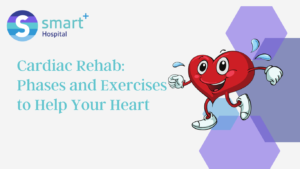Heart disease is a prevalent health concern worldwide, and Pakistan is no exception. What is particularly alarming is the increasing rate of heart disease among young adults in the country.
In this blog post, we will explore seven major risk factors contributing to heart disease in young adults in Pakistan. Understanding these risk factors and taking preventive measures promotes a healthier lifestyle, reducing heart disease in young adults.
1. Unhealthy Diet:
An unhealthy diet plays a significant role in the development of heart disease. Young adults in Pakistan often consume diets rich in saturated fats, trans fats, sodium, and added sugars.
To adopt a heart-healthy diet, focus on balanced nutrition, incorporating whole grains, fruits, vegetables, and lean proteins into your meals. Choose unsaturated fats, such as those found in nuts, seeds, and avocados, and limit processed foods and sugary beverages.
2. Lack of Physical Activity:
Leading a sedentary lifestyle and lacking regular physical activity are detrimental to heart health. Incorporate exercise into your daily routine, aiming for at least 150 minutes of moderate-intensity aerobic activity or 75 minutes of vigorous activity per week.
You should engage in activities such as brisk walking, jogging, swimming, cycling, or dancing. Strength training exercises a few times a week can also help improve heart health.
3. Tobacco Use and Smoking:
The use of tobacco including smoking, is a significant risk factor for heart disease. Smoking damages blood vessels reduces oxygen supply, and increases the risk of atherosclerosis.
Quitting smoking is crucial for heart health. Seek professional help or join smoking cessation programs to overcome this addiction. Support from family, friends, and healthcare providers can greatly enhance your chances of successfully quitting smoking.
4. Obesity and Overweight:
Obesity and being overweight contribute to heart disease by increasing the strain on the heart and elevating blood pressure and cholesterol levels. Maintain a healthy weight by adopting a balanced diet and incorporating regular physical activity into your lifestyle.
Focus on portion control, create a calorie deficit by consuming fewer calories than you burn, and consult a healthcare professional or a registered dietitian for personalized guidance.
5. High Blood Pressure:
High blood pressure is a silent killer that significantly increases the risk of heart disease. To manage blood pressure, reduce sodium intake, limit processed and salty foods, and opt for fresh, whole foods.
Engage in stress management techniques such as meditation, deep breathing exercises, or yoga. Regular monitoring of blood pressure and adherence to prescribed medications is vital for keeping blood pressure under control.
6. Diabetes:
Diabetes and heart disease often go hand in hand. Individuals with diabetes are at higher risk of developing heart disease. To reduce this risk, focus on maintaining stable blood sugar levels through a diabetes-friendly lifestyle.
Adopt a healthy eating plan, exercise regularly, take prescribed medications as directed, and monitor blood sugar levels regularly. Consult your healthcare provider for specific guidance on managing diabetes and reducing cardiovascular risk.
7. Family History of Heart Disease:
Having a family history of heart disease increases your risk. If your parents or close relatives have had heart disease, being proactive in your heart health is essential.
Ensure regular check-ups, including cholesterol and blood pressure screenings. Be aware of the risk factors and commit to a heart-healthy lifestyle, incorporating healthy eating habits, physical activity, and stress management techniques into your daily routine.
What to do if You Feel a Heart Attack?
Many people who have early signs of a heart attack hesitate to go to the hospital. They think that nausea or neck pain may be caused by something less serious. It’s also difficult to explain to a healthcare provider when they just feel that “something isn’t right.”
However, if there is even a slight possibility that you might be experiencing a heart attack, Doctor advises against hesitating and urges you to seek immediate emergency care. Acting swiftly and seeking medical attention early on significantly improves the chances of achieving the best possible outcome.
Even if your heart attack symptoms start off mildly, they have the potential to escalate rapidly into more severe ones. Some individuals may even faint or lose consciousness during a heart attack. It is crucial to avoid being behind the wheel when there is a risk of losing consciousness. In fact, if a loved one is driving you to the hospital, it can be hazardous (and frightening) for both of you if your symptoms worsen during the journey.
Regardless of being young and in good health, it is vital to familiarize yourself with the signs of a heart attack and take prompt action if you experience them.
In conclusion, heart disease poses a significant threat to young adults in Pakistan. However, by recognizing and addressing the risk factors discussed in this blog post—unhealthy diet, lack of physical activity, tobacco use, obesity, high blood pressure, diabetes, and family history—you can make informed choices and take proactive steps towards preventing heart disease.
Prioritizing a healthy lifestyle, including a nutritious diet, regular exercise, abstaining from smoking, maintaining a healthy weight, managing blood pressure and diabetes, and staying vigilant with family history, can significantly reduce the risk of heart disease. Let us empower ourselves with knowledge and make heart health a priority in our lives.





Pingback: Cardiac Rehab: Phases and Exercises to Help Your Heart - Smart Hospital